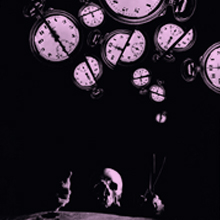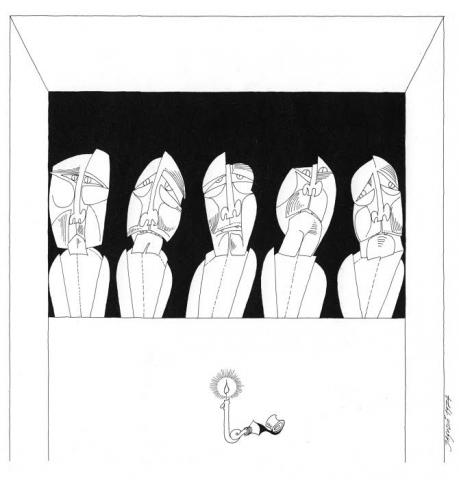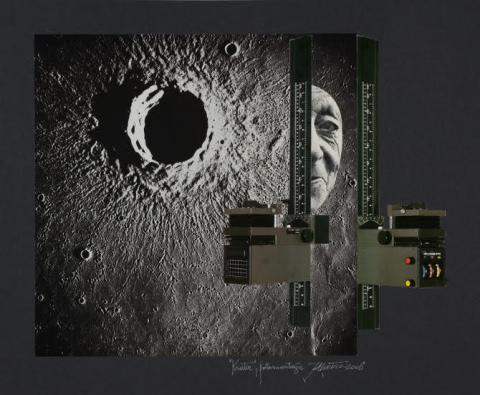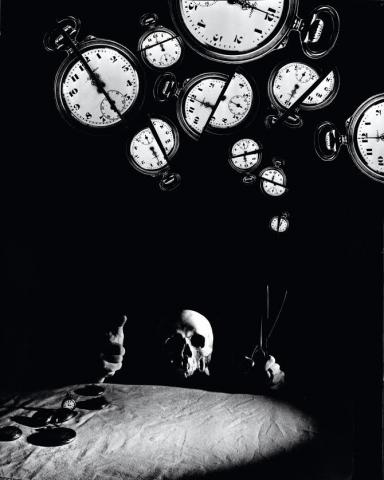
Stane Jagodič (Celje 15/6/1943) es uno de los más grandes artistas eslovenos del siglo XX que, como artista comprometido con la revolución social y estética, exploró múltiples técnicas y estilos plásticos, entre ellos la caricatura y siempre la sátira y el humor irreverente. Casi cumpliendo ocho décadas de existencia, decidió crear una Fundación para preservar su obra y su legado, como un grito contra la imbecilidad de las dictaduras políticas y sociales y el vacío mental de la posmodernidad liberal actual. Siempre inconformista, siempre irreverente, a pesar de su edad, nunca se detiene y mantiene viva su alma de artista y luchadora por buenas causas, como la paz.
OMS - Caro Stane, ¿cómo esta Esloveniaen los humores?
Stane Jagodič - En la carta con las preguntas, solo enfatizas las palabras caricaturista, caricatura y humor, pero también agrego la satírica, porque la sátira domina mis creaciones, pero, por supuesto, el humor también está presente, principalmente en caricaturas y fotomontajes anteriores.
Respecto a la sociedad. En la antigua Yugoslavia socialista, que también incluía a Eslovenia, los políticos tenían una actitud respetuosa hacia la cultura y la creación artística, que cambió significativamente tras la disolución del país. Inmediatamente después de la independencia de Eslovenia, el viejo periódico humorístico „Pavliha“, que había dado un gran impulso a la caricatura y otros géneros humorísticos, colapsó. Nunca olvides el papel del valiente satírico Hinko Smrekar. En 1994, fundé la Trienal eslovena Aritas-satirA, que promovía la caricatura y la literatura humorística-satírica a través de concursos abiertos y grandes catálogos, pero colapsó después de una década y sufrió críticas atroces por parte de críticos envidiosos. Algo similar sucedió con el grupo internacional Junij que, al igual que la Triennale Aritas-satirA, dirigí idealistamente durante más de 15 años sin sueldo alguno. Los políticos y críticos eslovenos tienen una actitud negativa hacia la sátira y el humor.
Muchas galerías de arte también se han derrumbado en Eslovenia, por lo que la joven generación de pintores, escultores y artistas gráficos eslovenos se gana la vida con gran incertidumbre. También hay cada vez menos caricaturistas y, por lo tanto, las exposiciones con temas humorísticos y satíricos son muy raras.
OMS - ¿Y el humor de Stane?
Stane Jagodič - En el siglo pasado me dediqué fuertemente al dibujo satírico, a la caricatura, por lo que recibí muchos premios en el extranjero, en exposiciones internacionales. Mis creaciones multimedia grotescas y comprometidas fomentan una sonrisa contenida, pero por otro lado mi lado humorístico exuberante también provoca risas, un humor feliz. Pero cabe señalar que durante más de 6 décadas, mi trabajo no solo se caracterizó por los cartoons, sino que también me dediqué intensamente a otros géneros técnicos: fotografía, collage tridimensional, ensamblaje, escenografía, performance y literatura.
OMS - ¿El envejecimiento perjudica la visión filosófica del humor, haciéndola amarga? Con la edad, con el peso de haber vivido mucho, existido, criticado repetidamente... ¿la mirada se vuelve más satírica o irónica?
Stane Jagodič - Afortunadamente, mi mano no tiembla en este momento, pero no sé cómo estará mañana. Tengo mano firme a la hora de escribir y hacer fotomontajes, que no realizo con la ayuda de técnicas digitales, sino con una tijera de mano afilada, que requiere cortes de una precisión virtuosa, similar al dibujo a pluma.
El envejecimiento no me impide una visión filosófica del humor y la sátira, porque una larga vida comprometida me ha dado la sabiduría suficiente para evaluar con seriedad el pasado y el presente y cultivar un mínimo de optimismo para el futuro. Si tienes salud física y mental, no hay sensación de vejez.
Llevo 14 años jubilado y hasta el día de hoy no me ha faltado la pasión creativa y la búsqueda de nuevas ideas sobre temas de actualidad que reflejan la civilización del siglo XX. y XXI. siglos.
OMS - ¿Qué es más difícil de aceptar cuando te haces mayor? ¿Se necesita un mayor esfuerzo para mantener el humor todos los días o ya no es una cualidad sino un defecto? ¿Te sientes envejecido? ¿Qué es para ti la vejez?
Stane Jagodič - Como he dicho, como una persona mayor, no me siento viejo o excesivamente joven, pero con la ayuda de mi amada esposa Greta y mis hijos trabajadores Jan y Vid, sigo siendo un terrícola activo que crea apasionadamente, sin el apoyo del Estado y los donantes. Andar en bicicleta y caminar en plena naturaleza también me desvela, por no hablar de comer sano.
OMS - Al mirar al pasado, ¿es importante mantener vivos los momentos más humorísticos, relegando las tragedias al olvido, o son más fuertes y destruyen los mejores momentos de la vida?
Stane Jagodič - Por supuesto que recuerdo momentos trágicos y difíciles, porque sin esas experiencias no habría podido expresarme activamente en el arte, ni habría podido comprender mi propio envejecimiento y muerte. Si una persona está sana, mira al futuro con humor y risas, pero si está enferma, a veces reacciona incluso con humor negro y una sonrisa amarga.
OMS - ¿Es más fácil mirar la vejez de los demás que tu propia "decadencia" física?
Stane Jagodič - Simpatizo con el deterioro físico y espiritual de las personas y, por supuesto, observo mi propia anatomía, que actualmente está cambiando visiblemente en el sentido «estético ideal».
OMS – Stane siempre ha sido creativo en la exploración de múltiples tecnologías y técnicas artísticas. ¿Cómo fue la adaptación a las nuevas tecnologías difíciles? La velocidad del cambio ha sido vertiginosa, lo que, por un lado, facilitaba ciertos trámites técnicos, también complicaba a los que no les gustaba el cambio. ¿Cómo te sucedió a ti? ¿Sigues prefiriendo las técnicas clásicas?
Stane Jagodič – Sí, siempre me ha gustado explorar las técnicas creativas clásicas tanto como sea posible, pero también he intentado ir más allá y explorar las tecnologías más recientes y, si es posible, aún por explorar, como spraygram, x ray art, bodygraphic. ...
OMS – ¿Y cómo ven tu trabajo las nuevas generaciones?
Stane Jagodič - La generación joven, como estudiantes de secundaria, creadores visuales graduados e historiadores del arte, cuando me visitan quedan impresionados por mis ideas comprometidas y provocativas, así como por los enfoques técnicos irreverentes que siempre he tratado de usar, lo que significa satisfacción espiritual para mi.
OMS – Pero la sociedad está cambiando drásticamente, especialmente a nuestros ojos mayores...
Stane Jagodič - Desafortunadamente, he sido testigo de muchos cambios negativos en la sociedad moderna, que señalo como satírico comprometido. La prosperidad aumentó en los países desarrollados y empeoró en los subdesarrollados, debido a la crisis ecológica, el saqueo de minerales preciosos en los países pobres y el militarismo lascivo.
La sociedad en realidad está cambiando, y la población realmente está aumentando en el planeta Tierra. El homo sapiens se está expandiendo desmesuradamente, aumentando las megalópolis de hormigón armado, vaciando lamentablemente los idílicos pueblos rurales. Y así las grandes ciudades, con la arquitectura salvaje que no respeta nada y la monstruosa industrialización, nos están conduciendo hacia el desastre ecológico. A esto asociamos pistoleros codiciosos y militaristas sanguinarios, lo que significa que estamos constantemente en una guerra brutal en cualquier parte del planeta.
Los grandes problemas de la sociedad moderna existen en todo el mundo y son significativamente acelerados por el capitalismo global, que cree en la divinidad del CAPITAL, pero se olvida de los valores humanísticos y culturales. Hoy en día, las manifestaciones con el conocido dicho 'Pan y juegos' son principalmente veneradas y apoyadas financieramente. Incluso la crisis ecológica no es advertida por el capital codicioso, que alimenta el crecimiento económico sin detenerse y lesionando gravemente, deformando el globo.
Desafortunadamente, la sociedad capitalista moderna no tiene la mejor actitud hacia la generación de ancianos, los jubilados, porque solo le interesan las ganancias.
OMS – ¿Qué pasa con la sociedad humorística?
Stane Jagodič - Como ya no participo en exposiciones de caricaturas, lamentablemente ya no tengo una visión real del género humorístico y satírico antes mencionado.
Cuando observo la creación visual durante el período de la crisis del covid y durante la guerra en Ucrania, como creador profesional, noto que la pintura y la escultura no son rejuvenecedoras, sino principalmente eclecticismo con un fuerte énfasis en colores rudimentarios (rojo, naranja, amarillo ), que también afecta a la moda, la escenografía, la ilustración y la publicidad llamativa. En este grupo también puedo mencionar los grafitis agresivos y los tatuajes repugnantes. ¡Decadencia!
Los humoristas de hoy le dan más importancia al ritmo corporal, al volumen de los gritos y menos al contenido. Bueno, también hay excepciones brillantes.
OMS - Para ti, ¿qué es el humor y su papel en la sociedad?
Stane Jagodič - Para mí, el humor es un motor de entretenimiento que ahuyenta la desgana y la angustia espiritual. El humor y la sátira son necesarios para cualquier orden social. El humor alivia el mal humor, mientras que la sátira llama la atención sobre las causas del mal humor. También estamos familiarizados con el humor negro, que cínicamente se burla de los momentos dolorosos con la ayuda de insultos.
Como mencioné antes, usé la sátira y el humor para suavizar mi bienestar mental y, al mismo tiempo, quería que las espinas resonaran en un círculo más amplio de personas. Siempre fueron bienvenidos por personas bien intencionadas, pero rechazados por los amargos oponentes a quienes estaban destinados.
OMS - ¿Te asusta la muerte o es morirse de risa la mejor manera de cerrar este ciclo? ¿Está preocupado por el futuro de su trabajo después de que se haya ido?
Stane Jagodic - No tengo mucho miedo a la muerte, pero tengo miedo a la inmovilidad, el dolor y la pérdida de memoria y la dependencia total de un extraño, por lo que apoyo la eutanasia.
A la edad de 80 años, estoy muy preocupado por el destino de mi extensa colección de obras multimedia, que se encuentran depositadas bajo tierra, en sótanos oscuros. También existe un amplio material documental: material publicitario, cartas, diplomas, premios... que reclaman su custodia. Y todo esto tiene lugar en un pequeño país subalpino que no tiene una verdadera actitud protectora hacia la sátira y el arte comprometido.

Transiency, india ink, 1974

Crater, photomontage, 2006

You too !, action - photomontage, 1967- 1972
Aging with humor - Stane Jagodič (80 years old) (Slovenia)
Stane Jagodič (Celje 15/6/1943) is one of the greatest Slovenian artists of the 20th century who, as an artist engaged in the social and aesthetic revolution, explored multiple techniques and plastic styles, including cartoonism and always satire and irreverent humor. Almost completing eight decades of existence, he decided to create a Foundation to preserve his work and his legacy, as a cry against the imbecility of political and social dictatorships and the mental void of today's liberal post-modernism. Always nonconformist, always irreverent, despite his age, he never stops and keeps alive his soul as an artist and fighter for good causes, such as peace.
OMS - Dear Stane, how is Slovenia feeling?
Stane Jagodič - In the letter with the questions, you only emphasize the words caricaturist, caricature and humor, I also add a satirical statement, because satire dominates my motives, but of course humor is also present, especially in earlier caricatures and photomontages.
Regarding society. In the unaligned socialist Yugoslavia, which also included Slovenia, politicians had a respectful attitude towards culture and artistic creation, which changed significantly after the breakup of the country. Immediately after the independence of Slovenia, the long-standing humorist newspaper Pavliha, which gave great impetus to caricature and other genres of humor, collapsed. In 1994, I founded the Slovenian Triennale Aritas-satirA, which promoted caricature and humorous-satirical literature through public competitions and large catalogs, but it collapsed after a decade and experienced insulting criticism from envious critics. A similar thing happened with the international Junij Group which, like the Aritas-satirA Triennale, I led idealistically for over 15 years without any payment. Slovenian politicians and critics have a negative attitude towards satire and humour.
Many Art Galleries have also collapsed in party-oriented Slovenia, so that the young generation of Slovenian painters, sculptors and graphic artists are making a living with great uncertainty. There are also fewer and fewer caricaturists, and as a result, exhibitions with humorous and satirical themes are very rare.
OMS - What about Stane's moods?
Stane Jagodič - In the last century I dedicated myself strongly to satirical drawing, to caricature, for which I received many prizes abroad, in international exhibitions. My grotesque and engaged multimedia creations encourage a restrained smile, but on the other hand my exuberant humorous side also triggers laughter, a happy mood. But it should be noted that for more than 6 decades, my work was not only characterized by cartoons, as I also dedicated myself intensely to other technical genres: photography, three-dimensional collage, assemblage, scenography, performance and literature.
OMS - Does aging impair the philosophical view of humour, making it sour? With age, with the weight of having lived a lot, existed, criticized repeatedly... does the look become more satirical or ironic?
Stane Jagodič - Fortunately, my hand is not shaking at the moment, but I don't know how it will be tomorrow. I have a firm hand when it comes to writing and making photomontages, which I do not do with the aid of digital techniques, but with sharp hand scissors, which require virtuous precision cuts, similar to pen drawing.
Aging does not prevent me from a philosophical view of humor and satire, because a long engaged life has given me enough wisdom to soberly assess the past and the present and cultivate a modicum of optimism for the future. If you have physical and mental health, there is no feeling of old age.
I've been retired for 14 years and to this day I haven't felt a lack of creative passion and the search for new ideas on current issues that reflect the civilization of the 20th century. and XXI. centuries.
OMS - What is more difficult to accept when you get older? Is greater effort needed to maintain the mood every day or is this no longer a quality but a defect? Do you feel aged? What is old age for you?
Stane Jagodič - As I've said, as an elderly person, I don't feel old or excessively young, but with the help of my loving wife Greta and hardworking children Jan and Vid, I'm still an active Earthling who creates passionately without the support of the State and donors. Cycling and walking in authentic nature also keeps me awake, not to mention eating healthy.
OMS - When looking at the past, is it important to keep the most humorous moments alive, relegating tragedies to oblivion, or are they stronger and destroy the best moments of life?
Stane Jagodič - Of course I remember tragic and difficult moments, because without such experiences I would not have been able to actively express myself in art, nor would I have been able to understand my own aging and death. If a person is healthy, he looks to the future with humor and laughter, but if he is sick, he sometimes even reacts with black humor and a bitter smile.
OMS - Is it easier to look at the old age of others than at your own physical "decay"?
Stane Jagodič - I sympathize with people's physical and spiritual deterioration and, of course, I observe my own anatomy, which is currently changing visibly in the «ideal aesthetic» sense.
OMS – Stane has always been creative in exploring multiple technologies and artistic techniques. How was the adaptation to the new difficult technologies? The speed of change has been vertiginous, which, on the one hand, facilitated certain technical procedures, also complicated those who did not like the change. How did it happen to you? Do you still prefer classic techniques?
Stane Jagodič – Yes, I always loved exploring classic creative techniques as much as possible, but I also always tried to go further and explore the most recent technologies and, if possible, still to be explored, such as spraygram, x ray art, bodygraphic...
OMS – And how do the new generations see your work?
Stane Jagodič - The young generation such as high school students, graduate visual creators and art historians when they visit me are impressed by my engaged and provocative ideas, as well as by the irreverent technical approaches I have always tried to use, which means spiritual satisfaction for me.
OMS – But society is changing dramatically, especially in our older eyes...
Stane Jagodič - Unfortunately, I have witnessed many negative changes in modern society, which I point out as an engaged satirist. Prosperity increased in developed countries and worsened in underdeveloped ones, due to the ecological crisis, the looting of precious minerals in poor countries and lascivious militarism.
Society is actually changing, and population is really increasing on planet Earth. Homo sapiens is expanding excessively, increasing the megapolis of reinforced concrete, unfortunately emptying the idyllic rural villages. And in this way the big cities, with the wild architecture that respects nothing and the monstrous industrialization, are leading us towards ecological disaster. To this, we associate greedy gunmen and bloodthirsty militarists, which means that we are constantly in a brutal war anywhere on the planet.
The great problems of modern society exist all over the world and are significantly accelerated by global capitalism, which believes in the divinity of CAPITAL, but forgets about humanistic and cultural values. Today, demonstrations with the well-known saying 'Bread and Games' are mainly worshiped and financially supported. Even the ecological crisis is not noticed by greedy capital, which fuels economic growth without stopping and grossly injuring, deforming the globe.
Unfortunately, modern capitalist society does not have the best attitude towards the elderly generation, the retirees, because it is only interested in profit.
OMS – What about the humorous society?
Stane Jagodič - As I no longer participate in caricature exhibitions, unfortunately I no longer have a real vision of the aforementioned humorous - satirical genre.
When I observe visual creation during the period of the covid crisis and during the war in Ukraine, as a professional creator, I notice that painting and sculpture are not rejuvenating, but mainly eclecticism with a strong emphasis on rudimentary colors (red, orange, yellow) , which also affects fashion, scenography, illustration and eye-catching advertisements. In this group, I can also mention aggressive graffiti and disgusting tattoos. Decadence!
Today's comedians place more importance on body rhythm, the volume of the screams and less on the content. Well, there are brilliant exceptions too.
OMS - For you, what is humor and its role in society?
Stane Jagodič - For me, humor is an entertainment engine that chases away reluctance and spiritual anguish. Humor and satire are necessary for any social order. Humor alleviates bad moods, while satire draws attention to the causes of bad moods. We are also familiar with black humor, which cynically mocks painful moments with the help of name-calling.
As I mentioned before, I used satire and humor to soften my mental well-being and at the same time wanted the thorns to touch a wider circle of people. They were always well received by well-intentioned individuals, but rejected by the staunch opponents for whom they were intended. If a person is healthy, he looks to the future with humor and laughter, but if he is sick, he sometimes even reacts with black humor and a bitter smile.
OMS - Does death scare you or is dying laughing the best way to close this cycle? Are you worried about the future of your work after you are gone?
Stane Jagodic - I am not overly afraid of death, but I am afraid of immobility, pain and memory loss, and complete dependence on a stranger, so I support euthanasia.
At the age of 80, I am really worried about the fate of my extensive collection of multimedia works, which are deposited deep underground, in dark cellars. There is also extensive documentary material: publicity material, letters, diplomas, awards ... that call for safe storage. And all this happens in a small subalpine country that has no real attitude towards satire and engaged art.
